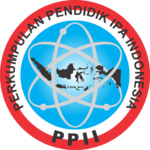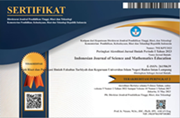Students’ Concept Mastery with the Web Inquiry Environment
Abstract
Technology has a vital role in the field of education. After the COVID-19 pandemic, the learning system has become more flexible. To keep making arrangements according to the development of the situation in the classroom and to avoid student passivity, an online platform is needed that involves students in conducting investigations. The study aimed to determine the student’s ability to understand the concepts in the discussion of Archimedes' Law.The participants involved consisted of 53 grade 7 junior high school students. The method used was descriptive quantitative to investigate students' inquiry abilities and determine their understanding of concepts. The research on concept mastery shows a significant difference in using web inquiry environment after the treatment. Therefore, the web inquiry environment is essential to improve students' concept mastery.Implementing the web inquiry environment is recommended to consider topics with experiments to ensure that all inquiry processes can be carried out efficiently.
Keywords
Full Text:
PDFReferences
H. Mardiana, “Lecturer’s Attitude towards Advance Technology and Its Impact on the Learning Process: A case study in Tangerang City Campuses,” J. Educ. Sci. Technol., vol. 4, no. 1, pp. 12-25, 2018.
R. Raja and P. C. Nagasubramani, “Impact of modern technology in education,” J. Appl. Adv. Res., vol. 3, no. 1, pp. 33-35, 2018.
X. Yang, M. Zhang, L. Kong, Q. Wang, and J.-C. Hong, “The Effects of Scientific Self-efficacy and Cognitive Anxiety on Science Engagement with ‘Question-Observation-Doing-Explanation’ Model during Schools Disruption in COVID-19 Pandemic,” Research Square, vol. 1, no. 1, pp. 1–28, 2020.
R. R. Antika, “Proses Pembelajaran Berbasis Student Centered Learning,” BioKultur, vol. III, no. 1, pp. 251–263, 2014.
K. Erol and T. Danyal, “Analysis of distance education activities conducted during COVID-19 pandemic,” Educ. Res. Rev., vol. 15, no. 9, pp. 536–543, 2020.
A. U. Putri, L. Rusyati, and D. Rochintaniawati, “The Impact of Problem-Solving Model on Students’ Concept Mastery and Motivation in Learning Heat Based on Gender,” J. Sci. Learn., vol. 1, no. 2, p. 71, 2018, doi: 10.17509/jsl.v1i2.9793.
D. A. Haidar, L. Yuliati, and S. K. Handayanto, “The effect of inquiry learning with scaffolding on the misconception of light material among fourth-grade students,” J. Pendidik. IPA Indones., vol. 9, no. 4, pp. 540–553, 2020, doi: 10.15294/jpii.v9i4.22973.
N. Khoiri, C. Huda, A. Rusilowati, Wiyanto, Sulhadi, and A. G. C. Wicaksono, “The Impact of Guided Inquiry Learning with Digital Swing Model on students’ Generic Science Skill,” J. Pendidik. IPA Indones., vol. 9, no. 4, pp. 554–560, 2020, doi: 10.15294/jpii.v9i4.26644.
E. Siregar, J. Rajagukguk, and K. Sinulingga, “Improvement of Science Process Skills Using Scientific Inquiry Models With Algodoo Media and Quotient Adversity in High School Students,” J. Transform. Educ. Educ. Leadersh., vol. 1, no. 2, pp. 2684–7086, 2019.
A. B. Sarioglan and I. Gedik, “Investigated effects of guided inquiry-based learning approach on students’ conceptual change and durability,” Cypriot J. Educ. Sci., vol. 15, no. 4, pp. 674–685, 2020, doi: 10.18844/cjes.v15i4.5050.
J. Lederman, N. Lederman, S. Bartels, J. Jimenez, and M. Akubo, “International Collaborative Investigation of Beginning Seventh Grade Students’ Understandings of Scientific Inquiry,” 2019.
M. A. Mahdiannur, W. Romadhoni, N. Sciences, U. Negeri, N. Sciences, and U. Kaltara, “Evaluation of senior high school students' scientific inquiry skills: A perspective from proposing action and interpreting results,” J. Penelitian Pendidikan IPA, vol. 5, no. 2, pp. 80–86, 2020.
D. I. Suwarni, S. Kurniasih, and R. T. Rostikawati, “Penerapan model pembelajaran think-talk-write (TTW) dan demonstrasi reciprocal untuk meningkatkan hasil belajar ekosistem Siswa SMP PGRI Suryakencana Cileungsi Kabupaten Bogor Universitas Pakuan, Jln Pakuan Po Box 452 Bogor,” J. Pendidik. Ilm., vol. 3, no. 3, pp. 90–95, 2018.
A. Shidiq, D. Rochintaniawati, and Y. S. (Page 01-13 ), “The Use of Self Construction Animation Learning Software to Improve the Students Concept Mastery on Structure and Functions of Plants,” Pancaran Pendidikan, vol. 6, no. 3. 2017, doi: 10.25037/pancaran.v6i3.31.
I. Ibrohim, S. Sutopo, M. Muntholib, Y. Prihatnawati, and I. Mufidah, “Implementation of inquiry-based learning (IBL) to improve students’ understanding of nature of science (NOS),” AIP Conf. Proc., vol. 2215, no. April 2020, doi: 10.1063/5.0000632.
B. Baumfalk, D. Bhattacharya, T. Vo, C. Forbes, L. Zangori, and C. Schwarz, “Impact of model-based science curriculum and instruction on elementary students’ explanations for the hydrosphere,” J. Res. Sci. Teach., vol. 56, no. 5, pp. 570–597, 2019, doi: 10.1002/tea.21514.
P. S. Dewi, A. Widodo, D. Rochintaniawati, and E. C. Prima, “Web-Based Inquiry in Science Learning: Bibliometric Analysis,” Indones. J. Sci. Math. Educ., vol. 4, no. 2, pp. 191–203, 2021, doi: 10.24042/ijsme.v4i2.9576.
P. S. Dewi, D. Rochintaniawati, and S. Parsaoran, “Profiling the context of natural history teacher candidate for the elementary school degree through web-based inquiry,” J. Inov. Pendidik. IPA, vol. 6, no. 1, pp. 49–58, 2020, doi: 10.21831/jipi.v6i1.30991.
Ü. Ormancı and S. Çepni, “Developing Web-assisted Science Material Based on Guided Inquiry Approach,” J. Inq. Based Act., vol. 9, no. 2, pp. 96–108, 2019.
M. Wang, B. Cheng, J. Chen, N. Mercer, and A. Paul, “The use of web-based collaborative concept mapping to support group learning and interaction in an online environment,” Internet High. Educ., 2017, doi: 10.1016/j.iheduc.2017.04.003.
B. Ulus and D. Oner, “Fostering Middle School Students’ Knowledge Integration Using the Web-Based Inquiry Science Environment (WISE),” pp. 242–256, 2020.
A. Rukajat, Pendekatan Penelitian Kuantitatif: Quantitative Research Approach. Yogyakarta: Deepublish Publisher, 2018.
J. W. Creswell, Educational Research: Planning, Conducting and Evaluating Quantitative and Qualitative Research 4th Edition. Boston: Pearson Education, Inc, 2012.
M. A. H. Lubis Mara Bangun; Manurung, Sondang R, “Effects of Scientific Inquiry Learning Model and Logical Thinking Ability of Senior High School Students Science Process Skills,” J. Pendidik. Fis., vol. Vol 6, No, pp. 70–75, 2017.
G. Zhou and J. Xu, “Microteaching Lesson Study: An Approach to Prepare Teacher Candidates to Teach Science through Inquiry,” Int. J. Educ. Math. Sci. Technol., vol. 5, no. 3, pp. 235–235, 2017.
A. Cayvaz, H. Akcay, and H. O. Kapici, “Comparison of Simulation-Based and Textbook-Based Instructions on Middle School Students’ Achievement, Inquiry Skills and Attitudes,” Int. J. Educ. Math. Sci. Technol., vol. 8, no. 1, pp. 34-43, 2020.
A. R. Pratami, “The Profile of Students’ Concept Mastery and Students’ Perception Using Semantic Network Analysis in Learning Global Warming,” 2020. Thesis: unpublished.
K. Subramaniam, B. Kirbyhigeyan, P. Harrell and C. Long, “Using Concept Maps to Reveal Prospective Elementary Teachers’ Knowledge of Buoyancy,” Electron. J. Sci. Educ., vol. 23, no. 2, pp. 1–18, 2017.
R. Giambattista, A., Richardson, & Richards, College Physics (3rd ed.). New York, NY: McGraw-Hill., 2010.
P. P. Pisdon, E. Enawaty, and I. Lestari, “Keterampilan Proses Sains Siswa SMA Pada Materi Laju Reaksi Menggunakan Model Pembelajaran Inkuiri Terbimbing,” J. Pendidik. dan Pembelajaran Khatulistiwa, vol. 7, no. 7, pp. 1-11, 2018.
H. Kim, “Inquiry-Based Science and Technology Enrichment Program: Green Earth Enhanced with Inquiry and Technology,” J. Sci. Educ. Technol., vol. 20, no. 6, pp. 803–814, 2011.
DOI: http://dx.doi.org/10.24042/ijsme.v5i3.13809
Refbacks
- There are currently no refbacks.
Copyright (c) 2022 Unit Riset dan Publikasi Ilmiah FTK UIN Raden Intan Lampung

This work is licensed under a Creative Commons Attribution-ShareAlike 4.0 International License.

Indonesian Journal of Science and Mathematics Education is licensed under a Creative Commons Attribution-ShareAlike 4.0 International License.





